The mental torture of gadolinium contrast toxicity
MRI contrast agents have known toxicity
If you’re reading this, then you’re probably one of the many people who have experienced the devastating effects of medication-induced toxicity. In particular, you may have been the victim of gadolinium contrast toxicity, a little-known but potentially life-altering condition that can result from the use of MRI contrast agents.
Us sufferers talk a lot about how MRI contrast agents are toxic to the body. One day, you’re having an MRI with contrast to investigate some symptoms. The next, you’re in an MRI horror story so surreal Stephen King must have penned it.
In this article, I’ve written about how MRI contrast dye poisoning damages mitochondria and our cells. The toxicity caused by radiology imaging contrast drugs affects our tissues, particularly connective tissues like bone, skin and joints. MRI contrast agents are toxic to our organs, like our livers, brain, kidneys and gut.
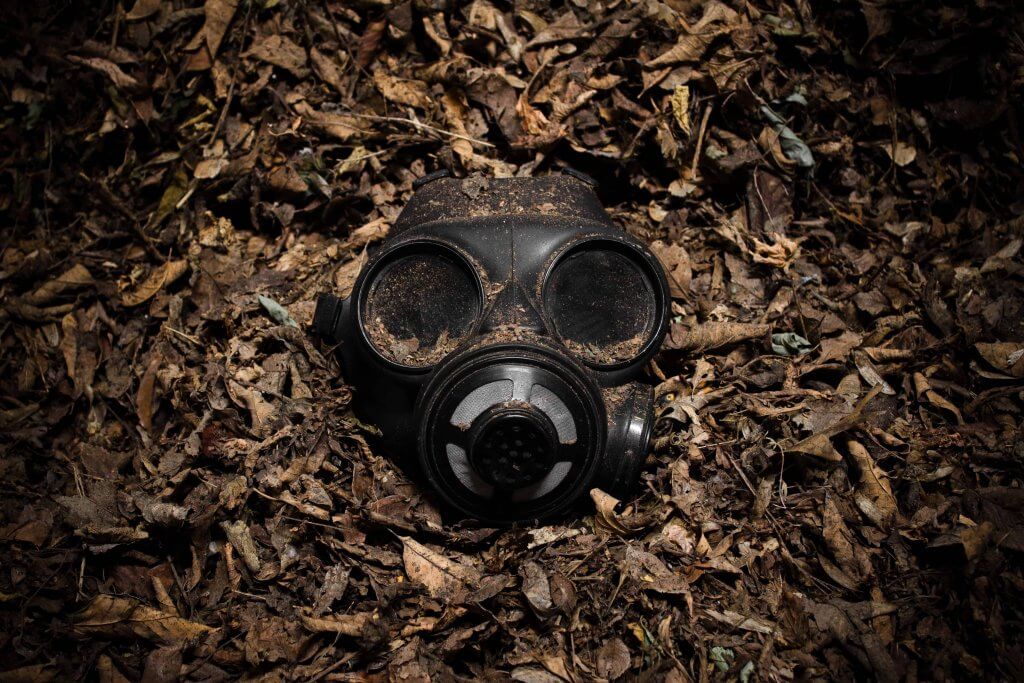
Why don't we discuss the effects of stress on people suffering from gadolinium toxicity?
But today, I wanted to talk about how gadolinium is also toxic to us emotionally.
Through my free clarity calls and client work, I’ve spoken to countless people who’ve suffered from an actual decline in their health after undergoing one or more MRI scans using contrast dyes. And on Facebook, I’ve interacted with even more.
And I’m more and more struck by the fact that so many of us are also going through a harrowing emotional experience.
There's a lot to be righteously angry about, when it comes to this medically-induced toxicity
Those of us who realise that we’ve been poisoned are absolutely furious that we’re going through this and that more people after us will go through this, too. We’re angry and bitter because no good long term safety studies have ever been done on any of the MRI contrast agents. Not a single one. And they’ve been about for 3 decades now. How can this be?
We’re furious because it’s been clear for over a decade that people with renal failure have been suffering from and dying as a direct result of their exposure to the heavy metal drugs used as contrast agents. They’ve received diagnoses of nephrogenic systemic fibrosis (NSF). What’s been happening to them is absolutely tragic. And yet, there’s still almost no research on how to mitigate their symptoms. So we’re furious on their behalf, but we’re also incandescent with rage on our own – those of us who aren’t in renal failure but still suffer.
NSF is being blamed on Gad retention in renal patients. But now we know that all of us are retaining it. Yet suddenly, the drug companies, FDA, and doctors are saying that Gad retention is not an issue for the rest of us. Really? Without any evidence? What a load of nonsense. Why aren’t they telling us the truth? Could it be because of what they’d stand to lose if they came clean? This article on the pharmaceutical cabal will enlighten you about what those drug companies are up to.
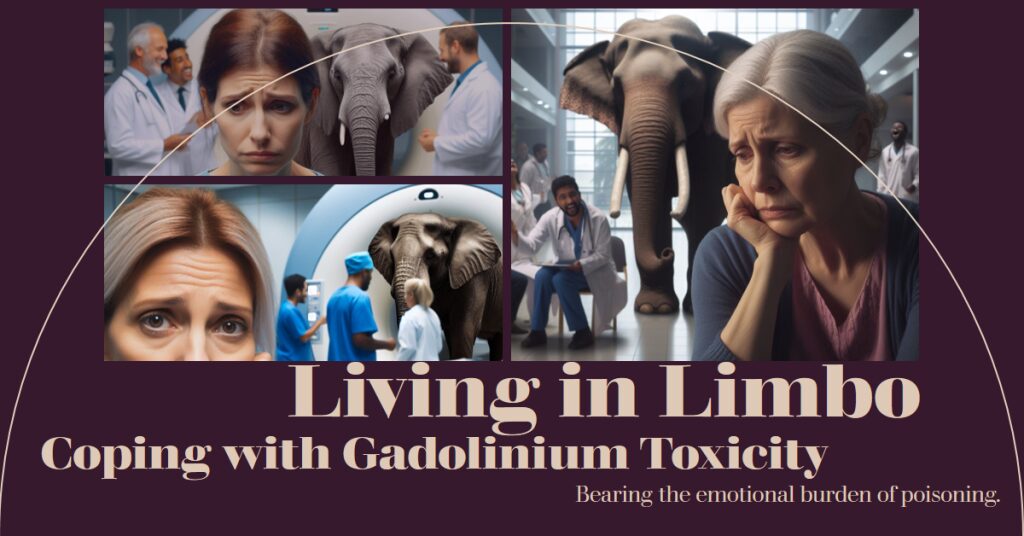
We’re furious that so little time and effort is going into excellent quality research that would help identify the long-term effects of Gd contrast retention. Some dire-quality studies out there now should never have passed the peer review process. Take, for instance, this terribly designed retrospective electronic chart audit.
There’s a study that showed petrifying increases in the aggression of multiple myeloma tumor cells and in mice, but a decade later and it hasn’t been cited in a single research paper. Nor has any further research been done on its remarkably concerning findings. What an absolute disgrace!
Are you anxious about how gadolinium contrast MRIs are affecting, or could affect, your health?
We don’t know what the future holds for us. How can we, without studies? Some people start to feel better. Some people seem to get progressively worse over time. Which group will you fall into? How will you know? Imagine the constant stress of living with this uncertainty, day in and day out.
And we aren’t just worried about how the future will affect us, and what other new chronic illnesses or symptoms we’ll suffer from. Or even whether the pain will ever abate.
Being poisoned by MRI contrast dye and anxiety go hand in hand. In fact, recently I’ve looked at a few rodent studies showing that the anxiety that many people with gadolinium toxicity feel is highly likely to have an organic basis. But that’s for another post.
For now just be aware that if you’ve noticed a surge in your anxiety levels following a gadolinium contrast scan, you’re not alone. It seems to be a very common reaction. But if you’re looking for tools to help you reduce your anxiety, check out this post on how to deal with anxiety naturally.
Are you anxious about those closest to you, and how your gadolinium-induced illness is affecting them?
We’re worried about our loved ones and concerned about being a burden on them. When we picture the future, we’re afraid we won’t be there for our kids. We’re worried we won’t be able to look after the people in our lives whose health is failing and who need our care. All of these burdens we carry in our hearts, and some of us are lucky enough to be able to share these fears with wonderful, supportive family and friends.

Does gadolinium toxicity make you feel isolated and alone?
But not all of us. Some of us feel horribly isolated and alone in all of this, even if we see and talk to other people every single day. Some of us feel that only other people who’ve been through the same thing will understand us. We only find an understanding of gadolinium toxicity in the support groups. During clarity calls with me, it’s sometimes the first time some people admitted out loud the devastating effect being poisoned by MRI contrast dyes has had on their mental and emotional health.
Has it affected your relationship with health care providers?
And far, far too many of us feel like we’ve been dismissed by our doctors and health care professionals. When we’ve told them that we are sick and in constant pain after gadolinium scans, all we get in return are eye rolls and prescriptions for antidepressants and other psych meds.
And not only that, but some doctors go as far as to insist on us getting more of these gadolinium MRIs to look for the cause of our new symptoms.
And if we refuse? Some doctors have discriminated against us, and told us that they won’t treat us without it. Breaking their Hippocratic oaths, violating informed consent procedures, and going against many other medical ethics recommendations. It amazes me how often I hear this from people living in America. They feel absolutely bullied into getting contrast when they don’t want it, just so that their doctor will keep them on!
Is this how you feel, too?
So we feel violated. Betrayed. Petrified. We’re in anguish. We feel isolated and alone. We feel suicidal. We’re anxious and depressed, and sometimes, the struggle to continue seems almost insurmountable.

We are grieving for our lost time. We are grieving because something incredibly precious has been stolen from us: our vitality, our life, our peace of mind, our hope, our independence, our ability to work and earn a living, our retirements, our savings, and even our trusted relationships. This is a real grief, not imagined. And it’s not something that we need to be medicated for. Our present and future were looted in less than two hours inside a sanitised MRI scanner for a drug that, in all likelihood, made no difference to our diagnoses or treatment and that we never needed.
We feel like victims because we are. But our hope of justice is remote. And while we’re surviving MRI contrast dye poisoning from gadolinium contrast agents, our lives are on hold. Too exhausted and sore to work or socialise; brain fog and cognitive impairment crushing our ability to function. Meanwhile, the invisibility of our illness and denial by doctors that there’s a problem leaves our families and friends confused.
Because sometimes our families, friends, colleagues and those we love flat out refuse to believe either that we’re suffering so much, or that gadolinium is the cause.
Does the conventional medical system have solutions for us?
We’ve lost our trust in the medical system that’s abandoned us and betrayed us. We don’t want more drug cocktails added to the mix. Even though so many of us are living in intolerable pain, many of us are reluctant to take pain killers. Or, when we try to get pain relief, some of us are treated like drug seekers. Or the pain meds just don’t do much, even if they are prescribed.
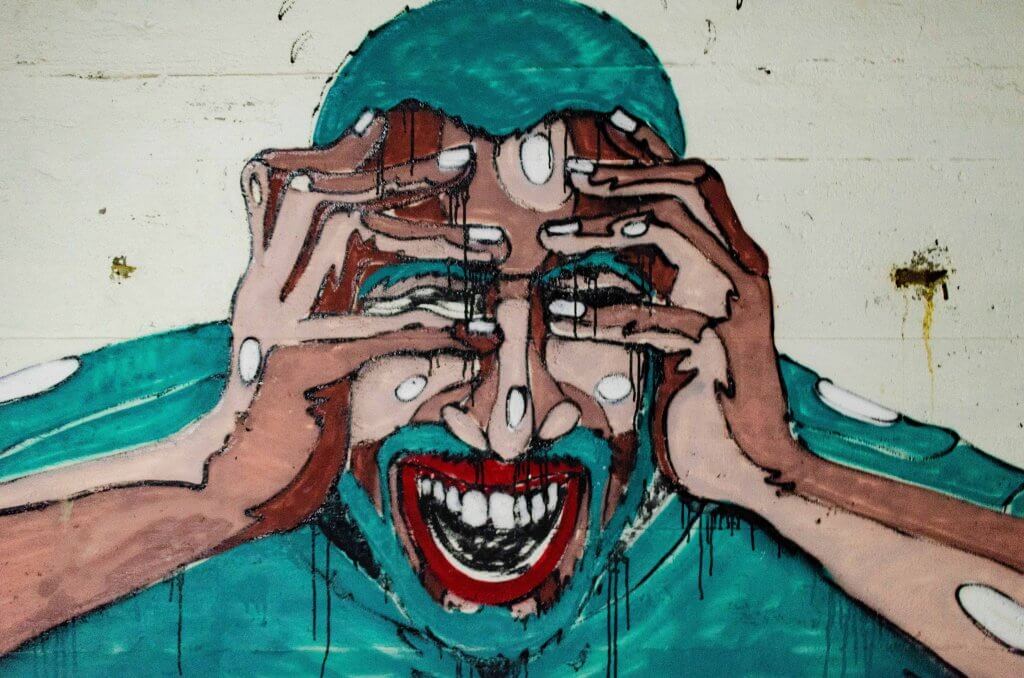
Meanwhile, who’s had to seriously consider whether or not they can trust their doctor enough to even bring up gadolinium, or other drug side effects with their doctors?
Do you blame yourself for allowing yourself to be injected with gadolinium?
And do you know what possibly the worst part is? We all blame ourselves most of all. We blame ourselves for letting this poison be injected into us. Many of us had niggling doubts that we raised with our doctors, but were reassured about. Many of us, in retrospect, feel like we should have known better, and we should have refused the contrast, despite all the pressure, and the risk of delaying or missing diagnoses. Some of us even carry around shame because of this.
So gadolinium is an incredibly toxic element. But it’s so much more than just physically toxic. It’s psychologically toxic. It’s emotionally toxic. And it’s toxic to our relationships.
Know that you're not alone in this struggle
You never signed up for this medication-induced emotional rollercoaster. And it feels like being strapped into SAW – The Ride at Thorpe Park, with a psychopathic carnival barker at the controls. At first, the ride starts innocently enough, with gentle ups and downs that lull you into a false sense of security. But before you know it, the ride takes a sharp turn, plunging you into a dizzying spiral of fear and anxiety.
The psychopathic carnival barker cackles with glee as he sends you hurtling through a series of twists and turns, each one more terrifying than the last. You feel like you’re losing control, unable to predict what will happen next or how to escape the ride’s relentless grip.
Just when you think you can’t take it anymore, the ride careens to a sudden stop, leaving you feeling disoriented and shaken. But the psychopathic carnival barker isn’t done with you yet. He sends you through the ride again and again, each time pushing you to the brink of emotional exhaustion.
Ultimately, you’re left feeling battered and bruised, like you’ve been on the world’s most intense and terrifying rollercoaster. And all you can do is wonder why you ever agreed to get on in the first place.
You're Not Alone: Understanding and Validating the Emotional Trauma of Gadolinium Contrast Toxicity
For those who have been affected by gadolinium contrast toxicity, the experience can be truly harrowing. You may have found yourself suddenly plunged into a world of emotional turmoil, with feelings of grief, betrayal, fear, anxiety, anger, guilt, shame, and depression all vying for dominance in your mind. And if that wasn’t enough, you may have also had to deal with the added burden of feeling isolated and alone, as friends, family, and even medical professionals dismiss your symptoms and tell you that you’re overreacting or imagining things.
But I want you to know that I understand what you’re going through. I’ve been there myself, and I know how devastating and overwhelming it can be to suddenly find yourself facing a future that looks nothing like the one you had planned. It’s normal to feel angry, scared, and uncertain about what the future holds. And it’s also expected to feel like you’re the only one who truly understands what you’re going through.
But I want you to know that you’re not alone. There are others out there who have gone through the same experience and who are willing to support and validate your feelings. And while I can’t offer a time machine to take you back to before your MRI, I can offer you something else: the knowledge that you’re not going mad and that your emotional response to this life-changing toxicity is entirely normal and appropriate.
So, if you’re feeling lost, alone, and unsure of what to do next, take heart. You’re not alone, and there are people who understand what you’re going through. And while the road ahead may be long and arduous, know that you don’t have to face it alone. Together, we can work to raise awareness of gadolinium contrast toxicity and support those who have been affected by it. And in doing so, we can help to create a brighter, healthier future for all.
Gadolinium Contrast Toxicity: How to Be an Ally and Advocate for Those Affected
As someone who has experienced the devastating effects of gadolinium contrast toxicity, I know how difficult it can be to have your voice heard and your symptoms taken seriously. All too often, those who have been affected by this condition are dismissed or downplayed, with medical professionals and loved ones suggesting that their symptoms are all in their heads or that they’re simply experiencing a mental health problem.
But the truth is that gadolinium contrast toxicity is a very real and debilitating affliction, with a range of physical and emotional symptoms that can have a profound impact on a person’s life. While it may be challenging to articulate these symptoms’ complex and sometimes contradictory nature, it’s important to remember that you’re not alone.
That’s why I’ve written this blog post: to help give a voice to those affected by gadolinium contrast toxicity and to provide a resource that can be shared with others to help them understand what you’re going through. Whether you’re struggling to explain your symptoms to a medical professional or simply looking for a way to help your loved ones empathise with your experience, this post will be a helpful tool in your journey towards healing and recovery.
Of course, I also recognise that everyone’s experience with gadolinium contrast toxicity is unique and that there is no one-size-fits-all approach to supporting those affected by this condition. However, there are a few things that allies can do to help:
- Listen: One of the most important things you can do as an ally is simply listen to the person affected by gadolinium contrast toxicity. Don’t dismiss or downplay their symptoms, and don’t suggest that they’re merely experiencing a mental health problem. Instead, offer a safe and non-judgmental space for them to express their feelings and experiences.
- Believe the person: It can be incredibly invalidating and isolating when someone dismisses or downplays your symptoms, suggesting that they’re all in your head or that the research doesn’t support your experiences. If someone has come to you with concerns about gadolinium contrast toxicity, it’s important to believe them and take their symptoms seriously. Don’t dismiss their experiences or suggest that they’re exaggerating or making things up. Instead, offer a safe and non-judgmental space for them to express their feelings and concerns.
- Apologise, if appropriate: If you’re a medical professional who has prescribed a drug that has harmed your patient, even if you did it in all good conscience and never expected the person to go through hell as a result, it’s important to acknowledge the harm that has been caused and apologise. This can go a long way towards fostering trust and helping the person feel heard, validated, and supported.
- Advocate: There are many ways that allies can help advocate for someone with gadolinium contrast toxicity. This might involve accompanying them to medical appointments, helping them communicate with medical professionals, or simply providing emotional support as they navigate this complex and challenging condition. Allies can also help raise awareness of gadolinium toxicity in the greater community. The more people who become aware of this condition, the more support will start being brought in within the medical care system and alternative health workers.
Ultimately, the most important thing you can do as an ally to someone with gadolinium contrast toxicity is to offer empathy, compassion, and support. By listening to their experiences, believing them when they talk about their symptoms, educating yourself about the condition, advocating for them in their medical care, and apologising if appropriate, you can help them feel heard, validated, and supported as they navigate this formidable and often isolating challenge.
Raise awareness of gadolinium contrast toxicity. Share this post now
Gadolinium contrast toxicity is a serious condition that can have a profound impact on a person’s life. Please share this post to help raise awareness and support those who are struggling. Working together can help validate their experiences and provide the compassion and understanding they deserve. To make it even easier, I’ve provided some tweetable quotes that you can use if you wish.
Have you noticed a sudden change in your mood and anxiety levels after receiving gadolinium contrast? This post might help explain why. #gadoliniumtoxicity #MRIhorrorstory
Feeling anxious and low lately? It might be related to gadolinium contrast toxicity. This post explains the emotional impact of this serious condition. #gadoliniumtoxicity #MRIhorrorstory
If you've experienced a sudden change in mood and anxiety after receiving gadolinium contrast, this post might help explain what's going on. #gadoliniumtoxicity #MRIhorrorstory
You can even copy one of these tweetables and share it by clicking on one of the social media icons at the side or bottom of this page.
Or, if you want to help raise awareness of gadolinium contrast toxicity on other social media platforms, here’s how:
- Copy the URL of this post and paste it into a new social media post.
- Add a brief message about why you’re sharing the post, such as “This post helps explain the emotional impact of gadolinium contrast toxicity. Please share to help raise awareness and support those who are struggling.”
- Use relevant hashtags, such as #gadoliniumtoxicity or #MRIhorrorstory, to help your post reach a wider audience.
- Tag any friends or family members who might be interested in the post or who might be able to support those affected by gadolinium contrast toxicity.
- Consider sharing the post more than once, such as on different days or at other times of day, to help reach a wider audience.
What hope is there for the future?
And after all of that vitriol, is there any hope? Yes. All of these things can be addressed. It might take a lot of hard work. You might need extra support to help get you through it. You might need therapy to help you work through it.

Other things that can help: Meditation, mindfulness, practising gratitude, talking with a good friend who’ll listen to you, and working on forgiveness can all help. Try to get into nature, relax, and reconnect with the things that bring you joy. Even optimising your diet, working on your gut health and taking supplements can have surprising effects on your mood and anxiety levels.
Together, we stand shoulder to shoulder throughout this trial
What sort of things do you do to help deal with the toxicity of gadolinium on the mind? Please leave an answer in the comments, because other people with gadolinium toxicity read this blog, and they’re trying to understand what’s going on with them too. Sometimes we all need to hear about the positive things we can do to regain our emotional balance.
Have you been affected by gadolinium toxicity or gadolinium deposition disease? Are you seeking a natural way to reclaim your health? Are you prepared to use diet and lifestyle to rebuild your life? Contact me to learn how I can help you navigate your journey back towards good health.
If you’d like to find out why I’m so passionate about helping other people with gadolinium toxicity, I’ve written more about my own experience with gadolinium here and here. And if you need some guidance about strategies to manage your anxiety levels naturally, this post tells you all you need to know about how to deal with anxiety.
I’ve written a guide on gadolinium toxicity and MRI contrast dye poisoning. It’s free, and you can download it here.
If you’d like to read something meatier on gadolinium toxicity, I’ve also written a book available from all the major ebook retailers. You may also be able to get your library to stock it. You can find the book Contrasts: More Than Meets The MRI here.


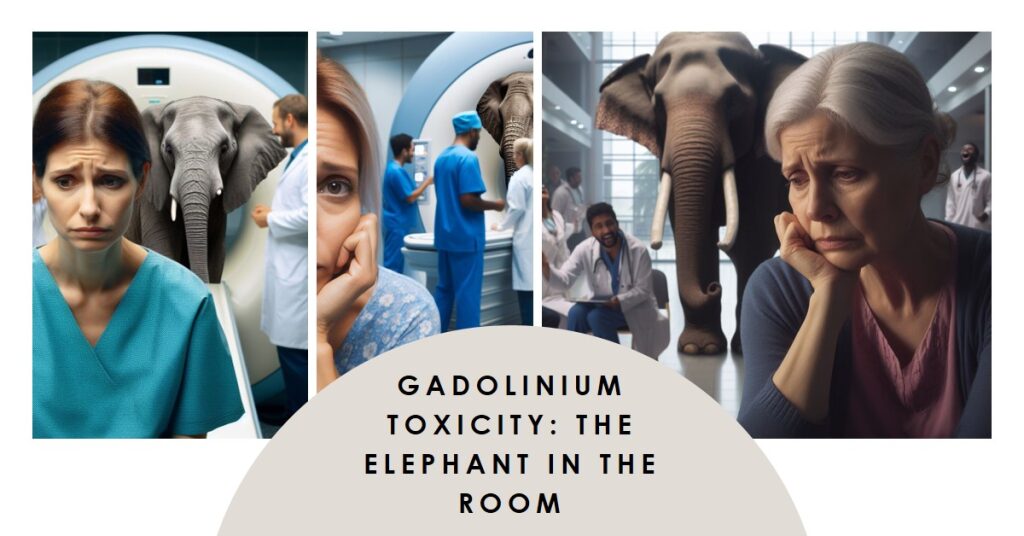
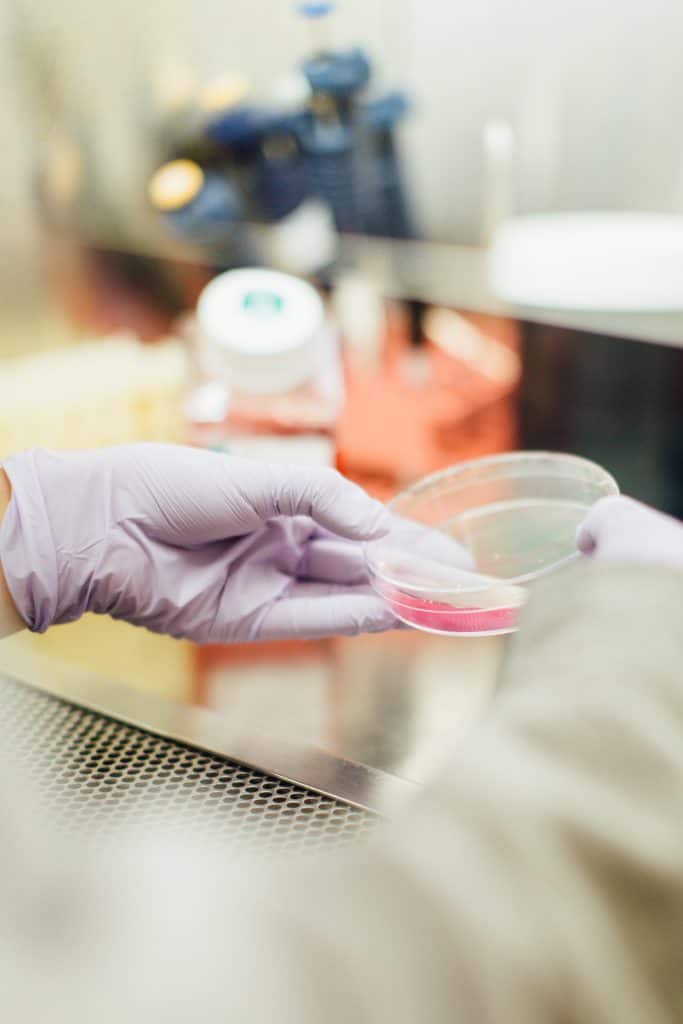
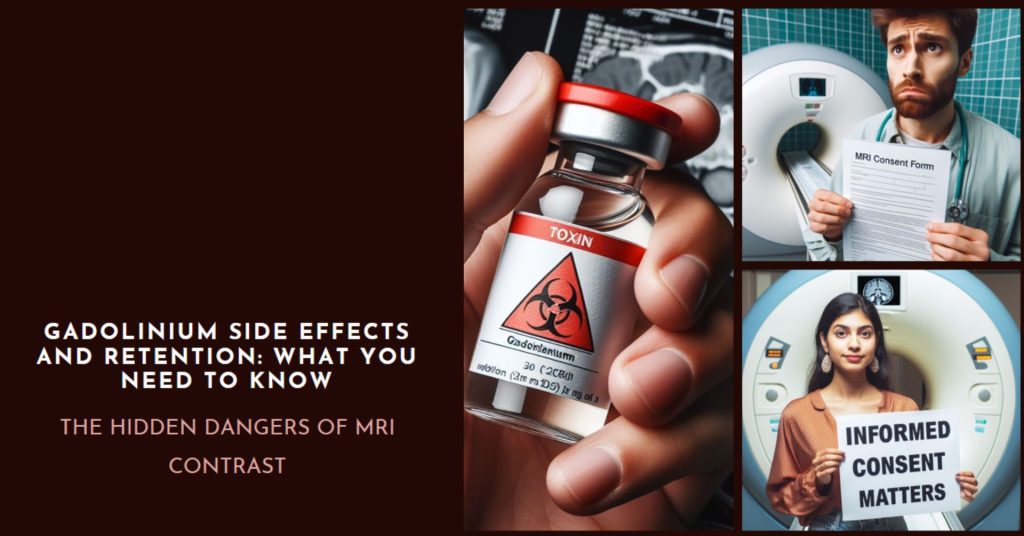


I have a loved one, that’s going through this. Has a rash in forehead and around mouth. They said kinda like lupus… but not sure also might ber nsf. She was overdose 2 times with contrast, also multiple MRI’s with contrast due to brain injury. Her life has been hell since. Burning in feet and hands. And a variety of auto immune diseases. Can not get doctors to listen. Think it’s in her head. Medical community is just as ignorant as the general public. And drug companies covering it up. But have all the money in the world for lawyers to fight it. So frustrating.
I’m so terribly sorry to hear this. I can only imagine what’s she’s been going through. It’s beyond frustrating. Would she consider making some drastic changes to her diet?